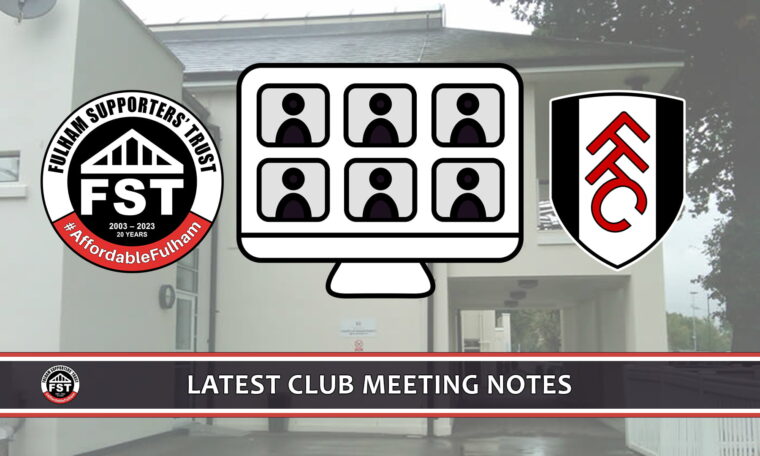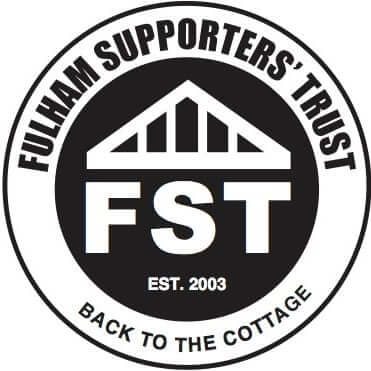Notes from December meeting with FFC

On Wednesday 13th December 2023 at 13:30, the Fulham Supporters’ Trust (FST) met with Fulham FC via video conference.
The Club was represented by:
- Alistair Mackintosh (Chief Executive)
- David Daly (Non-Executive Director, DD)
- Carmelo Mifsud (Communications Director, CM)
- Katy Brecht (Head of Ticketing, KB)
- Jack Burrows (Marketing Director, JB)
The FST was represented by:
- Simon Duke (Chair, SD)
- Ian Clarke (Vice Chair, IC)
- Jerry Cope (Treasurer & Membership Secretary, JC)
- Steve Nicholson (Board Member, SN)
HOW IT WORKS
At our regular monthly meetings, Trust board members normally ask questions relating to as many topics as possible in the time available, based on responses from members to the advance notification of the meeting and our own observations from interacting with the wider supporter base. The Club then gives its position, which is discussed. These notes are therefore a statement of both points of view. The Trust continues to press both the Board’s and its members’ view at this meeting and in separate meetings.
Often members ask similar questions, and, in these cases, we try to summarise, provide the Club with feedback and gain as much useful information as possible in the time available. We also prioritise new and time-critical topics, whilst also seeking updates on longer running issues.
You can access notes of all previous meetings on our web site, including the most recent information on key topics not covered at this meeting.
On this occasion the meeting focussed on ticket pricing and sale of tickets. Other topics raised by members will be pursued separately and directly with the Club, and where necessary raised at our January meeting.
SD opened the meeting by congratulating the team on their recent two 5-0 victories and informing the Club that following the Trust AGM and elections, Tom Greatrex and Dan Crawford had not offered themselves for re-election to the Trust Board, Jerry Cope and Hayley Davison had been re-elected to the Board, and Jakub Krupa and Steve Nicholson had been elected for the first time.
TICKET PRICING AND SALE OF TICKETS
The Trust Position
SD then opened the discussion on ticketing issues by stressing that the Trust’s Affordable Fulham campaign did not want to disrupt the field of play, but the Trust were trying to ensure that the Club had a sustainable fan-base of Fulham supporters going forward, whatever the circumstances. Season ticket prices at Fulham had been historically reasonable, but recent increases of 10% and 18% annually for existing season ticket holders, more for new season ticket holders this season, meant that although still arguably reasonable for many within the horseshoe, no longer gave Fulham a pricing advantage in attracting and retaining fans. A significant issue for the Trust was the cost of matchday pricing, which meant that supporters who could not afford a season ticket or could not practically (say because of shift patterns) attend every match were being priced out and it would appear were being replaced by away fans in home areas, even within the horseshoe.
SD emphasised the excellent support that the Trust had secured for its yellow card protest across the wider fan base and media, not just Trust members. There had also been unanimous support at the Trust AGM for continuing the campaign and both Marco Silva and Tim Ream and many ex-players and commentators had publicly supported the need for affordable pricing. SD asked whether the Club appreciated the depth of feeling amongst supporters on the Club’s pricing policy?
The Club Response
In response AM questioned whether the Trust was representative of the wider fanbase on pricing. The Club had received many expressions of support about its pricing approach; they had sold more season tickets than targeted this season; and higher priced games were selling out quickly and probably could be priced higher and still sell out. AM said the Club’s policy was to provide reasonable pricing for many season tickets coupled with dynamic stretch pricing, based on supply and demand, for one-off tickets, with some advantage in terms of price and priority for members unable to purchase season tickets. The Club had also sold tickets for some bigger games eg Chelsea at a lower matchday categorisation than last season, and he wondered whether this was understood by the Trust and supporters.
AM added that open letters and protests were not helpful as the Club was reliant on the support of the owners to improve facilities and maintain the team’s competitiveness.
AM pointed out also that there was limited elasticity of demand in pricing; attendances for lower priced games were lower than for higher priced games, and the cheaper family blocks were often the last to sell out. He emphasised that in addition over 1,200 tickets were also being distributed through the Foundation as part of a general drive to develop and diversify the fanbase. Finally he made clear that the Club did listen to the views of the Trust, but although there was always room for change, the Club were satisfied that their ticketing strategy was working.
Away Fans in Home Areas
In response JC questioned whether tickets where sold were finding their way to Fulham supporters or potential Fulham supporters. For the less high-profile games, like the recent Wolves and Forest games, the number of no-shows seemed very high, even though the matches were in theory sold out or nearly sold out. This suggested that away supporters and touts were gaming the Club’s approach to ticket sales. This was now extending to away tickets where a noticeable number of Liverpool supporters appeared in the Fulham away end at Anfield.
IC added that the Manchester United game was a particularly difficult example for home fans to swallow. They had been unable to secure tickets, but there were a lot of MU fans in home areas, including one complete section in the Putney End, which the Trust had highlighted to the Club in its open letter to which it had not received a formal response. IC was also aware that a Forest fan had no difficulty in purchasing a ticket at the Hammersmith End seemingly because he had purchased tickets for previous games, all of which were versus Forest.
KB responded that the Club always tried to investigate where it received direct reports of visible away fans in home areas, but this was less easy for games like Forest which had gone on general sale and where purchasers had, for instance, London addresses. This was because where a game went on general sale, the only due diligence undertaken by the Club was a postcode check so any away fan living away from the postcodes nearest their club could well be able to purchase a ticket.
Trust Ideas
IC said that the Trust had made a number of concrete suggestions over the years on ticket pricing and process, but these appeared not to have been considered fully by the Club. He added that a key issue was the lack of transparency by the Club on its ticketing strategy. Those who just could not afford to go to every game had no idea what the prices for each game would be until a few weeks before a game, so could not plan the economics of their personal attendance pattern. There was of course an issue about the unpredictability of TV selections, but he urged the Club to be more transparent and communicate more about its approach.
SN and IC stressed that the Trust’s aim was that tickets found their way affordably to current and potential Fulham fans. Ways of doing this might include use of loyalty points, or a variation thereof, for big match member ticket sales, bundling or pairing of tickets (buy one high profile and one low profile game) and that price increases recognised the current cost of living pressures. The Trust was not suggesting this necessarily but noted that another London club was now monitoring and taking action on season-ticket no-shows above a set limit. IC also pointed out that Clubs of a comparable size to Fulham in the South and in London had top category matchday tickets available at lower prices than Fulham.
Trust Conclusion
SD concluded by asking the Club to consider some of the Trust’s ideas, and if they were not to be actioned, to respond with reasons. The Trust would repeat some of its ideas formally to the Club. The Trust was determined to be constructive, but its members and Fulham fans generally were both upset and worried about the Club’s ticketing approach, not least the effect this could have on building a sustainable fan base. This was not an issue that the Trust could drop.
Club Conclusion
AM responded by saying the Club would continue to listen, but, as indeed the Trust itself had made clear, commercial ticket pricing was a matter for the Club’s Board. The Club were happy with this season’s approach to pricing. It was successful both commercially and in terms of the increase in season tickets and matchday tickets being sold.
The meeting closed at 14:45

